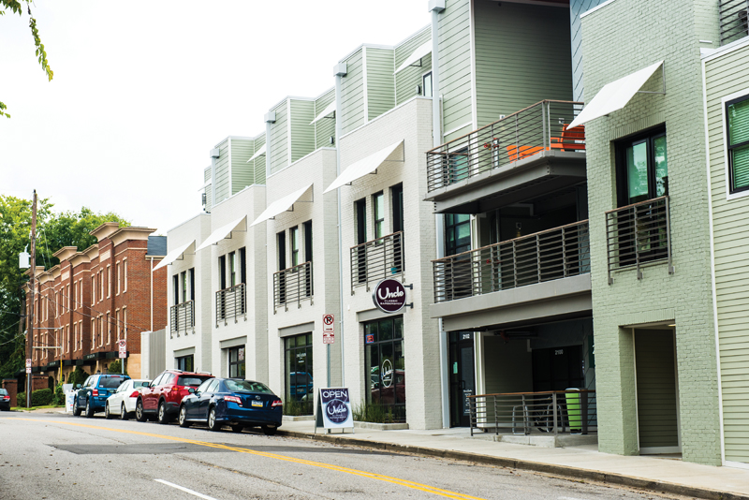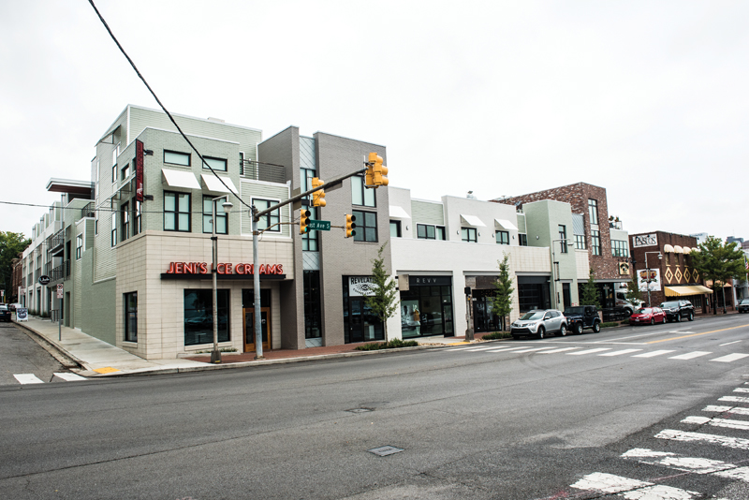When it comes to restaurant and bar openings, the Gulch is hot, Germantown is smokin', 12South is burgeoning, and, hell, even Donelson is "hip." But is Hillsboro Village still cool? After the closing of several Village anchors — including Boscos, Sunset Grill, and most recently Sam's Sports Grill — it's reasonable to wonder.
It used to go without saying in the decadent '90s and early Aughts that the Village was the spot to be seen among the party people of Nashville. Local restaurateur and unofficial mayor of Hillsboro Village Randy Rayburn upped the cool quotient when he opened Sunset Grill in November 1990 — if you wanted to spot country stars after the CMA Awards, his bar was the place to go. Thanks to a deep and interesting wine list and a menu that rode the wave of California cuisine, Sunset Grill represented a radical change from the traditional fern bars and steakhouses that had dominated the previous decade of Nashville's dining scene.
Across Belcourt Avenue, Jody Faison was developing his own small restaurant empire in the '80s and '90s with his eponymous Faison's and The Iguana as well as JoeD's Chicken Club, a restaurant that was little more than an alleyway of debauchery between Faison's other two eateries and drinkeries. Along with Sunset, Faison's establishments made up what was affectionately referred to as "The Vodka Triangle," and cranberries didn't stand a chance in the face of all those Cosmos and Cape Cods.
Even after Faison's restaurant dynasty went downhill due to his personal and legal troubles, the Village rebounded with the addition of The Trace and another Rayburn concept, Cabana. Chef Jeremy Barlow, who operated Tayst for eight years just outside of the Village proper, was one of the opening chefs at The Trace in 1997. "Before Randy opened Sunset Grill, the only place we went near there was The Villager, because their foosball table was better than the one upstairs at The Gold Rush," says Barlow. "But once the Triangle got started, it was inevitable that you'd either start or end your night in the Village."
The rest of the Village up and down 21st Avenue remained fairly staid and stable, with a mix of retail and beloved if not necessarily spectacular restaurants like Baskin-Robbins, Wong's, Pancake Pantry, Taste of Tokyo and Fido. After ownership of The Trace changed hands in 2003, the stability of the neighborhood's drinking and dining options began to get a lot shakier. The new owner of The Trace, Ken Perry, soon found himself under an eviction lawsuit by the building's owners, and for years a succession of different restaurants moved in and out of the space like peripatetic hermit crabs, often under further clouds of controversy and litigation. Do you remember dining at Mr. T's Tuscan Grill, Veranda, Bombasha Brazilian Steakhouse or Boca Loca? No? Well, that's not a surprise. Not many people did. The building at 2000 Belcourt Ave. is now occupied by Aladdin's Hookah Bar & Lounge, so there's not a lot of fine dining going on in there anymore; rent that tops $12,000 a month, according to a lawsuit filed against former tenant Boca Loca, has definitely made it a problematic proposition for future restaurant tenants.
Another major change to the gestalt of the Village took place in 1997, when H.G. Hill Realty reconfigured the Pancake Pantry space and developed the northeast corner of the strip as a combination retail/restaurant/residential building. According to Rayburn, residential zoning was not in place at the time, so developers promised the upper floors would be a hotel, and they limited leases to 11 months and 29 days to fall under the existing guidelines. At the same time, Vanderbilt University was purchasing properties in the Village, a phenomenon that was actually discouraging developers.
"Nobody wanted to do anything, because they were all waiting for Vandy to buy up the whole Village up to Acklen," says Rayburn. "H.G. Hill was only allowing three-year leases at the time, so it was difficult to invest in your business."
Wanting to be a good neighbor, the university came to the table with landowners, businesspeople and developers to establish an institutional overlay that would set a hard boundary to the south at Wedgewood for Vanderbilt's expansion. "Basically, we played Monopoly with Vandy to keep them out of the Village," says Rayburn. "We struck a grand bargain to avoid what had happened with Yale in New Haven, and Vanderbilt stepped up to protect the character of the neighborhood."
Part of the deal was the development in 1999 of an Urban Design Overlay for Hillsboro Village, with stakeholders coming together with Metro Planning to establish a series of regulations and best practices for future architectural and business changes in the neighborhood. The UDO seeks to maintain the character of the existing buildings by encouraging varied heights and design of storefronts, requiring parking lots to be placed behind buildings while still allowing for on-street parking as a traffic-calming method and to preserve the pedestrian-oriented urban environment.
Even with the overlay, there was considerable uproar in 2014 when the southwest corner of the Village at Acklen Avenue was developed as Hill Center Acklen, a mixed-use building with two floors of apartments above a strip of retail spaces. Al Thomas, the owner of the recently shuttered Sam's Sports Grill, which had a long run in the block next-door to the new development, is not a fan. "That building is ugly," says Thomas. "It looks like hell! I can't believe the neighborhood didn't demand that it look like the rest of the Village."
However, that's not exactly how the UDO works. The architect of the project was actually one of the people whose businesses were displaced by the development. Manuel Zeitlin occupied the Zeitgeist Gallery and sits on the advisory committee that reviews all proposed architectural changes under the overlay. Zeitlin recused himself from that particular discussion, but the rest of the committee — made up of architects, local business owners and neighborhood representative appointed by the Planning Commission and District 18 Metro Council member Burkley Allen — worked closely with the developers to stay within the suggested guidelines.
"The committee is made up of thoughtful people who aren't just opposed to any change," says Allen. "They asked for a four-story building at Acklen and wanted to change the overlay. The committee wouldn't allow it, but they did compromise on an extra foot of height to work within the topography of the lot."
With the recent sales listing of the buildings formerly occupied by Sam's and Boscos — and currently vacant — down the street at 1803-5 21st Ave., there has been a lot of speculation as to whether another complete remodel is in the offing.
Allen doesn't believe that is impossible, but it may not be likely. "That building is limited to 35 feet at the street, and the facade is an important part of the Village and is established as a 'character-defining building' under the overlay. Under the city's 'complete street' initiative, new owners might discover that they wouldn't actually gain any space if they remodeled because we would require wider sidewalks."
Allen walks a delicate line between preservation and encouraging new investment in her district. "The Village is still considered high-end real estate, and rents are a part of the issue. Business pioneers and chefs looking to start their own restaurants go to undiscovered streets. I'm doing what I can to make sure that potential buyers are aware of the design constraints beforehand, because you need to have a realistic picture of what you can do with the property. Investing a realistic amount would allow for reasonable rents and potentially attract independent tenants instead of chains."
Rayburn agrees with this line of reasoning. "You need to allow for renewal and refurbishment. Restaurant buildings have a useful life of 30 to 40 years before the plumbing and the wires wear out, but Hillsboro Village doesn't have as many local owners with ties to the community. That's what made the Village special, and why 12South and Eighth Avenue are doing well. If we lose the local edge, it's just another Main Street, USA."
This is all not to say that new businesses are not coming to the Village; it's just that they are primarily duplicative of what is or was already there. Baskin-Robbins has been replaced by Sweet Cece's and a new Jeni's location (which opened within a block of where Bob Bernstein and Irma Paz first introduced Nashville to Jeni's addictive milk-fat-laden ice cream at their Hot & Cold). Revelator Coffee has recently started brewing kitty-corner across 21st from neighborhood stalwart Fido, and Double Dogs is packing in the sports bar enthusiasts 50 steps away from Sam's front door and a pitching wedge away from the Sportsman's Grille.
New quasi-local investment is on the way in the form of three restaurant projects that Fresh Hospitality is planning for the Sunset Grill building, which the company purchased from Rayburn after he closed his flagship restaurant. Fresh has relocated their headquarters to Nashville from Birmingham, Ala., and though they are aggressively expanding their holdings of 15 restaurant chains in their portfolio, they do emphasize partnerships with local owner/operators.
Their plans for the Sunset property include a Taziki's and an outpost of Juice Bar, which will probably serve Fresh Hospitality's Octane coffee brand. (Where Hillsboro Village denizens used to concentrate on prodigious vodka intake, apparently they are now more concerned with being fully caffeinated.) The operators of Biscuit Love have strongly hinted that they will also be a part of the new development, offering specialty breakfast-themed items during essentially the same hours as their neighbors at Pancake Pantry.
Fresh managing partner Matt Bodnar isn't concerned about Hillsboro Village's perceived decline in cool factor. "A good analogy would be that the Village is an incredible neighborhood, but doesn't have the trendy edginess of East Nashville anymore. We think it's more along the lines of Green Hills and West End. We didn't take out a density map and say, 'We need a Taziki's here.' Instead we looked at our portfolio and decided what would fit best for the neighborhood. Our decision to purchase Randy's building was more opportunity-driven. We saw a great property in a great neighborhood, and we're excited to be a part of it."
Barlow remembers feeling that way when he first planned to open Tayst. "The magic of the Village was that it always had a full blend of concepts from breakfast to late night, plus a full-on dive bar with The Villager. We really wanted to be a part of the energy. The question now is how to keep the character of the neighborhood while we allow for expansion through conscious construction. I don't know if Hillsboro Village has necessarily lost its luster, but the pie has definitely been sliced thinner. The person who owns the building decides the concept and whether it is local or not. The only way to control what goes in is for the public to choose whether to frequent a place."
Only time will tell if the next round of development in Hillsboro Village will encourage Nashville diners to continue to vote with their wallets.
Email arts@nashvillescene.com






